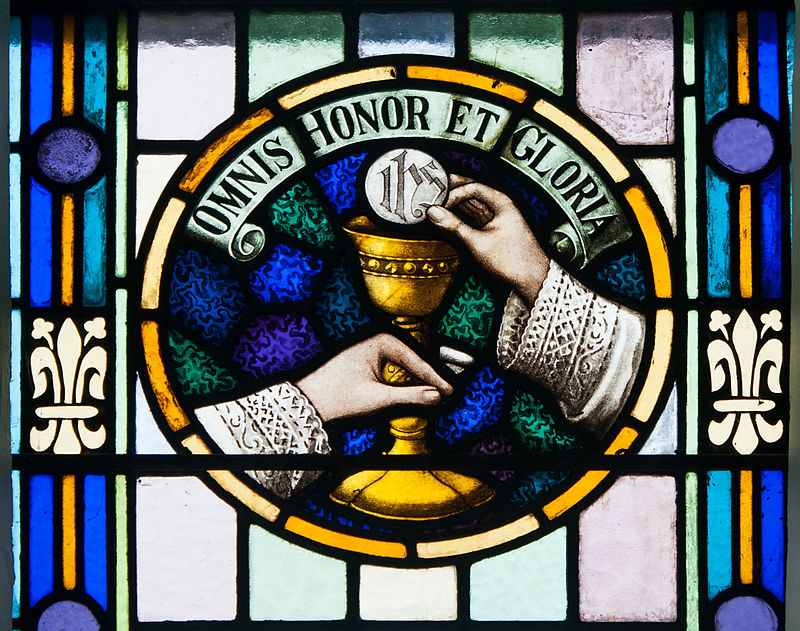You often see silly things said or written about the doctrine of the transubstantiation of bread and wine into the flesh of our Lord, so I want to clear up what seem to me to be the two most common misconceptions. Instead of what you might read,
1. Transubstantiation Is Just Another Word For The Real Presence
The doctrine of transubstantiation does not say anything that was not said in the Patristic era, and indeed in the New Testament, about the Eucharist: that the bread and wine really do become the body and blood of Jesus Christ (“is” means “is”), and that while nothing is changed of the physical attributes or elements or “accidents” of the eucharistic bread and wine, there is a change in nature or “substance.” This is the apostolic teaching, which we find in the Synoptic Passover narratives, in John 6, in First Corinthians, in the Didache, in Ignatius of Antioch, in Justin Martyr, and so on. The doctrine of transubstantiation merely uses Aristotelian language to express the same thing that the Bible and the Fathers say. It’s always baffling to me to see so much confusion on this point, which ought to be obvious if you actually understand the doctrine: it really says nothing else, and to pretend that it does seems to me to can come only from confusion or willful misreading.
2. Transubstantiation Is Not The Only Catholic Doctrine Of The Real Presence
The Trent Fathers were well aware that the Fathers did not use the word transubstantiation, and the Council of Trent’s teaching on transubstantiation (as on pretty much everything else) is much more nuanced than most critics give it credit for.
Here is the ascetic economy of Chapter IV of Session XIII:
And because that Christ, our Redeemer, declared that which He offered under the species of bread to be truly His own body, therefore has it ever been a firm belief in the Church of God, and this holy Synod doth now declare it anew, that, by the consecration of the bread and of the wine, a conversion is made of the whole substance of the bread into the substance of the body of Christ our Lord, and of the whole substance of the wine into the substance of His blood; which conversion is, by the holy Catholic Church, suitably and properly called Transubstantiation.
The word “conversion”, or “change,” is the typical Patristic expression, and the only thing that this says is that it is “suitable” and “proper” to call this transubstantiation.
Notice what it doesn’t say: it doesn’t say that it’s the only way you can talk about the Real Presence; it doesn’t even say it’s the best way; it only says that if you say transubstantiation is wrong, you’re wrong. You can be a perfectly faithful Catholic and never talk about transubstantiation, never think about it, never discuss it (as indeed countless have and perhaps still do), use completely different language to talk about the Real Presence (which would be speculative if this language is not Patristic, but there is certainly no a priori ban on non-transubstantiation language). Transubstantiation is not “the” Catholic teaching on the Eucharist, it is “a” teaching–one which is valid, one which is “suitable” and “proper”, but it is certainly not, to coin a phrase, the article on which the Catholic doctrine of the Eucharist stands or falls.
For my part, I tend to think that undue focus on transubstantiation is basically a distraction. Again, as a restatement of the classical apostolic faith, if understood–if the categories it uses are neither confused nor reified–, it can be clarifying, and I embrace it wholeheartedly. But–as Aquinas emphasized–it is a restatement of a teaching on a mystery which is fundamentally incomprehensible, and of such beauty and goodness and truth that all flesh should really fall silent.
And, really, if you have a problem with the doctrine of the Real Presence, there is only one good remedy for you: Eucharistic Adoration. No, seriously. Go, go.
















